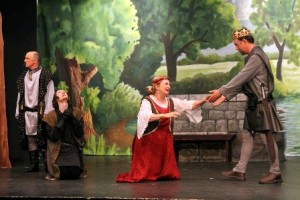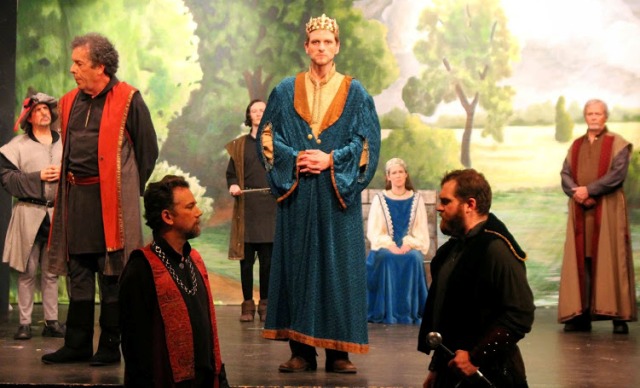Accusations. Exiles. Assassinations. Abdication. Imprisonment. Shakespeare’s RICHARD II has a full complement of underhandedness.
Family power struggles are never easy: not today, not hundreds of years ago, and certainly not in the 1300’s. Shakespeare’s RICHARD II provides a somewhat accurate history as to the fall of the Boy King.
A (not so) quick summary: Henry Bolingbroke accuses the Duke of Norfolk, Thomas Mowbray, for the Duke of Gloucester’s death. Mowbray isn’t the murderer but only an accomplice. Gauntlets are thrown. Richard agrees the men should joust, but then changes his mind at the last minute and, instead, exiles both men – Mowbray for life and Bolingbroke for ten years. Bolingbroke’s father, John of Gaunt, already in failing health and overcome with grief from his son’s exile, dies. Richard, in need of funds to fight the Irish, seizes Gaunt’s estate (leaving Bolingbroke exiled and penniless), and heads for Ireland, leaving the Duke of York (Richard’s uncle) in charge.
Bolingbroke secretly returns to England to find the nobles of England far from happy, Henry Percy the most vocal of Richard’s critics. Richard returns from Ireland to find not only the banished Bolingbroke but also that the lands he took from Gaunt have been reclaimed in Henry’s name. To fuel the fire, Bolingbroke has executed three of Richard’s dearest advisors. And, lest not forget, the false rumor of Richard’s death which causes his army to disbands and prompts the commoners to revolt. The Duke of York attempts to remain neutral of the state of affairs but joins Bolingbroke’s rebellion. Realizing he barely controls England, Richard II goes into hiding. When Bolingbroke and Richard meet to discuss the terms of a peace accord, Bolingbroke seizes Richard and has him imprisoned. Cornered and with little option, Richard is forced to publicly confess crimes against England, resulting in his handing over the crown to Bolingbroke who later becomes King Henry IV. Richard, while imprisoned, is soon killed by Sir Pierce of Exton in the mistaken belief it is King Henry’s wish. Upon seeing Richard’s dead body, Henry denounces the killing and decides to visit the Holy Land to wash the blood of Richard’s death from his hands.

Comedic moment in this serious history of Richard II – The York Family Circus as we call it. Duke of York (Henry Moncure III), Aumerle (Sean McGuire), Duchess of York (Patti Allis Mengers), Bolingbroke (David Hastings). Richard II continues til June 28 outdoors weather permitting (Arden Gild Hall if rain).
For the most part, Arden Shakespeare Gild’s offering is commendable. Director, Tayna Lazar, stages the opus almost intact. The original offers a play in five acts; Lazar chooses to create two acts of nine scenes each. The omitted Act II, Scene 4 (original script order) isn’t of great import.
To begin, one must note, learning to speak Shakespeare (especially the verse) is becoming something of a lost art. Some people blame the teachings of “Method” acting for this decline in the United States. There are rules for heightened language. The American Shakespeare Center in Staunton, Virginia, the Royal Shakespeare Company, and at the Globe Theatre in London, pay strict attention to those rules, creating a considerable difference in the final product. I recently had the pleasure of working with a member of The American Shakespeare Center. That recent opportunity, my unending love of Shakespeare and my tutelage by the magnificent Barbara Reilly at St. Mark’s High School guide me in my views of Shakespeare.
What sets RICHARD II apart from Shakespeare’s other works is the language – it is one of only a few of Shakespeare’s plays written entirely in verse and contains no prose. The use of metaphor is a particularly sturdy foundation for Richard’s character with strong relationships to nature and heavenly attributes. The language is more eloquent than earlier historical works, and clearly establishes the tone and themes of the play: power, family, identify, loyalty. Richard uses language to create and re-create his story and competing realities.
As with any role, speech should easily flow as if it is the actor’s own thought and not mere recitation of lines. Given Shakespearean verse is not common speech, extra care must be taken and the technique honed for greatest impact. These are pitfalls which should be addressed prior to mounting such types of work. Many actors can “get by” performing Shakespearean comedies or other light fare but, when dealing with the hardcore works, the devil is in the details. RICHARD II is a complex play with complex emotions. Lesser skilled actors rarely reach the breadth and depth required to consummately deliver the required emotional nuances of one’s character. Therein lies the issue with this particular production.
Shakespeare’s historical pieces require a fully realized, in-depth approach and delivery; both of which were lacking in this production. The delivery of the gorgeous and powerful language was flat. The lack of internalizing Shakespeare’s written word in order to engage the audience when spoken by the actors disappointed me. Blocking was static, especially that of background actors who often failed to realistically convey the slightest emotion. Active listening by all on stage (an essential element for group gatherings) can be achieved with proper guidance. I rarely became engrossed and, at times, drifted away to look up at the trees or other scenescape. Most awkward was the attempted comedic relief in Act V, Scene III (Arden’s Act II, Scene V).
Dan Tucker rises to the challenge in the roles of John of Gaunt and Bishop of Carlise. His proficient vocal metering of verse commands with an energetic, stately tambour. Greg Faber presents a roughly polished Richard II. Faber, being a young actor, could do the role great justice with training in classical acting in order to capture a complete character with decisive motivations. Many others miss the mark with clichéd deliveries, uneven expressions and simple lack of commitment.
As for additional details, there are a few others I would like to mention. The cons: the neighbor with a chainsaw, the neighbor with the fireworks and make-up (too much blush on male actors). The pros: costumes, music and weather. From what I could tell, the costumes are part of the vast and beautiful collection that Arden Shakespeare Gild has created over the years. I just wished that we could have been treated to more. I see no reason for the Queen to wear the same costume throughout when (free) inventory is available. The quaint Shepherd’s Pipes gently eased audience members to their seats while the bucolic outdoor setting of Frank Stephens Memorial Theater and absolutely perfect weather complimented the evening quite nicely.
THE LIFE AND DEATH OF RICHARD THE SECOND
by William Shakespeare
Directed by Tayna Lazar
June 12 – 28, 2014
Arden Shakespeare Gild
Frank Stephens Memorial Theater
Arden, DE 19810
(302) 475-3126
www.ardenclub.org/shakespeare-gild


